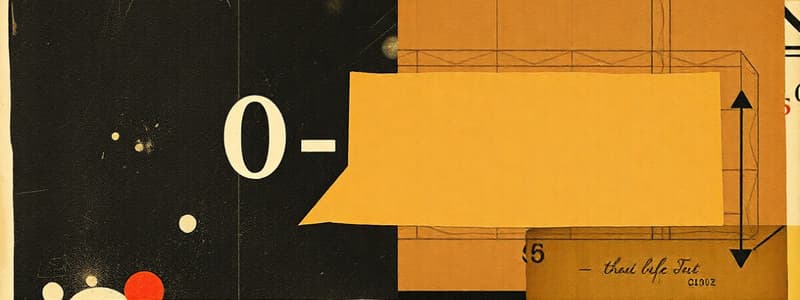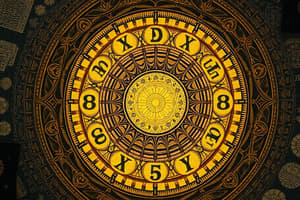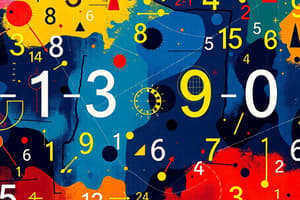Podcast
Questions and Answers
Which of the following statements is TRUE regarding the relationship between real numbers and complex numbers?
Which of the following statements is TRUE regarding the relationship between real numbers and complex numbers?
- All real numbers are complex numbers, but not all complex numbers are real numbers.
- Real numbers and complex numbers are completely distinct sets, with no overlap.
- All complex numbers are real numbers, but not all real numbers are complex numbers.
- Real numbers are a subset of complex numbers, where the imaginary component is zero. (correct)
What is the fundamental concept that allows us to manipulate and represent concepts in mathematics, enabling it to form the basis for many other disciplines?
What is the fundamental concept that allows us to manipulate and represent concepts in mathematics, enabling it to form the basis for many other disciplines?
- The definition of axioms.
- The use of algorithms.
- The use of symbolic language. (correct)
- The concept of infinity.
Which of these statements correctly describes the relationship between rational and irrational numbers?
Which of these statements correctly describes the relationship between rational and irrational numbers?
- Rational numbers are a subset of irrational numbers.
- Irrational numbers are a subset of rational numbers.
- Rational and irrational numbers are completely distinct sets, with no overlap.
- Rational and irrational numbers are both subsets of a larger set called real numbers. (correct)
Which mathematical operation is the inverse of exponentiation?
Which mathematical operation is the inverse of exponentiation?
Which of the following expressions represents a polynomial?
Which of the following expressions represents a polynomial?
Which of the following is a key characteristic of a quadrilateral?
Which of the following is a key characteristic of a quadrilateral?
Which mathematical concept is used to represent the total distance around the outer boundary of a two-dimensional shape?
Which mathematical concept is used to represent the total distance around the outer boundary of a two-dimensional shape?
Consider the set of integers {-3, -2, -1, 0, 1, 2, 3}. Which of the following accurately defines the term 'integers'?
Consider the set of integers {-3, -2, -1, 0, 1, 2, 3}. Which of the following accurately defines the term 'integers'?
In a right-angled triangle, if the angle $\theta$ is such that $\sin(\theta) = \frac{a}{c}$ and $\cos(\theta) = \frac{b}{c}$, and if $a = 1$, $b = \sqrt{3}$, what is the value of $ \tan(\theta)$?
In a right-angled triangle, if the angle $\theta$ is such that $\sin(\theta) = \frac{a}{c}$ and $\cos(\theta) = \frac{b}{c}$, and if $a = 1$, $b = \sqrt{3}$, what is the value of $ \tan(\theta)$?
Given a function $f(x) = x^3 - 6x^2 + 9x$, at what values of $x$ does the function have a local maximum?
Given a function $f(x) = x^3 - 6x^2 + 9x$, at what values of $x$ does the function have a local maximum?
If a set A has 4 elements and set B has 3 elements, how many possible relations are there from set A to set B?
If a set A has 4 elements and set B has 3 elements, how many possible relations are there from set A to set B?
A car's position is given by the function $s(t) = t^3 - 6t^2 + 5t + 10$, where $s$ is in meters and $t$ is in seconds. What is the car's instantaneous acceleration at $t=2$ seconds?
A car's position is given by the function $s(t) = t^3 - 6t^2 + 5t + 10$, where $s$ is in meters and $t$ is in seconds. What is the car's instantaneous acceleration at $t=2$ seconds?
How many permutations of the letters in the word 'MATHEMATICS' exist, where the vowels must appear in lexicographical order?
How many permutations of the letters in the word 'MATHEMATICS' exist, where the vowels must appear in lexicographical order?
Flashcards
What is mathematics?
What is mathematics?
The branch of mathematics that focuses on the study of quantity, structure, space, and change.
What are rational numbers?
What are rational numbers?
Numbers that can be expressed as a fraction p/q, where p and q are integers and q ≠ 0.
What are irrational numbers?
What are irrational numbers?
Numbers that cannot be expressed as a fraction of two integers.
What is addition?
What is addition?
Signup and view all the flashcards
What is an equation?
What is an equation?
Signup and view all the flashcards
What is a triangle?
What is a triangle?
Signup and view all the flashcards
What is volume?
What is volume?
Signup and view all the flashcards
What are solids?
What are solids?
Signup and view all the flashcards
Sine (sin)
Sine (sin)
Signup and view all the flashcards
Logic
Logic
Signup and view all the flashcards
Derivative
Derivative
Signup and view all the flashcards
Integral
Integral
Signup and view all the flashcards
Graphs
Graphs
Signup and view all the flashcards
Study Notes
Fundamental Concepts
- Mathematics studies quantity, structure, space, and change.
- Symbolic language represents and manipulates mathematical concepts.
- Mathematics underpins scientific, engineering, and technological disciplines.
Number Systems
- Natural numbers are counting numbers (1, 2, 3...).
- Whole numbers include natural numbers and zero (0, 1, 2, 3...).
- Integers are whole numbers plus their negatives (...-3, -2, -1, 0, 1, 2, 3...).
- Rational numbers can be expressed as a fraction p/q, where p and q are integers and q ≠ 0.
- Irrational numbers cannot be represented as a fraction of two integers.
- Real numbers encompass rational and irrational numbers.
- Imaginary numbers involve the square root of -1 (√-1), denoted by 'i'.
- Complex numbers are in the form a + bi, where 'a' and 'b' are real numbers and 'i' is imaginary.
Arithmetic Operations
- Addition combines numbers.
- Subtraction finds the difference between numbers.
- Multiplication is repeated addition.
- Division is repeated subtraction or finding a quotient.
- Exponentiation is repeated multiplication.
- Roots are the inverse of exponentiation.
Algebra
- Variables represent unknown quantities.
- Expressions combine variables, numbers, and operations.
- Equations state equality between expressions.
- Inequalities show inequality between expressions.
- Polynomials involve variables, coefficients combined by addition, subtraction, and multiplication.
- Factoring breaks expressions into simpler components.
- Solving equations finds values satisfying the equation.
Geometry
- Points have no size.
- Lines are infinitely extending collections of points.
- Angles are formed by two rays sharing an endpoint.
- Polygons with three sides are triangles (three angles).
- Four-sided figures are quadrilaterals.
- Circles have all points equidistant from the center.
- Area measures a two-dimensional region.
- Perimeter is the total boundary length.
- Volume measures three-dimensional space.
- Solids are three-dimensional objects with surfaces and volume.
Trigonometry
- Trigonometric functions relate sides and angles in right-angled triangles.
- Sine, cosine, tangent, cotangent, secant, and cosecant are trigonometric functions.
- Trigonometry is used for solving triangles, navigation, engineering, and astronomy.
Calculus
- Limits describe the value a function approaches as input changes.
- Derivatives measure the rate of change of a function.
- Integrals accumulate a function over an interval.
- Calculus is applied to optimization problems, motion analysis, and curve sketching.
Discrete Mathematics
- Logic studies reasoning and arguments.
- Sets are collections of objects.
- Relations are connections or mappings between sets.
- Functions are specific types of relations.
- Counting methods involve permutations and combinations.
- Graphs visually represent relationships.
Studying That Suits You
Use AI to generate personalized quizzes and flashcards to suit your learning preferences.




